Gunmen and sexism: On the road with Mexico's women truckers
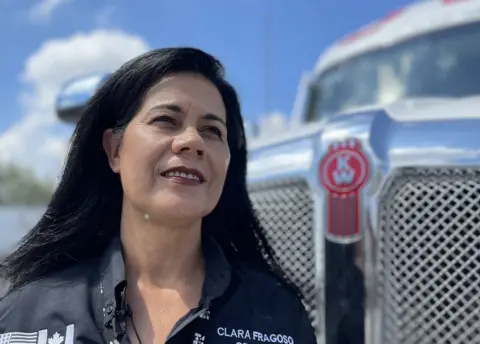 Leire Ventas
Leire VentasFewer than 3% of all lorry drivers globally are women, even though employers acknowledge that they are safer drivers. But in Mexico, where gender-based violence and armed robbery are common, it has proven hard to attract them to the profession. BBC 100 Women travelled with women truckers on some of the country's dangerous roads.
"Now they'll fire three shots, they'll leave me here wrapped in this blanket and no-one is going to find me," thought Clara Fragoso, as she lay in the bushes a short distance from a busy road.
It was the middle of the night and she should have reached her destination - Tuxpan, on the Gulf of Mexico coast - hours earlier. Instead, she had been forced out of her lorry, and a man was now pointing a gun at her.
It began when a car with flashing lights drove up from behind and signalled at her to pull over. It looked like a police car, but it wasn't.
Hooded men climbed out and ordered her to walk into the bushes and lie on the ground while they checked the trailer.
"I was already saying goodbye to this world," says Fragoso, 57.
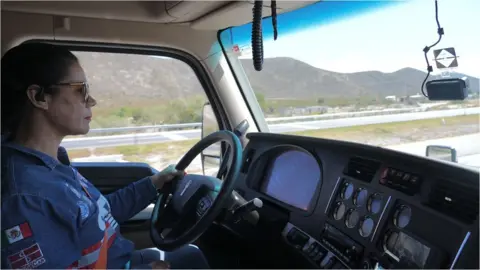 Álvaro Álvarez
Álvaro ÁlvarezBut the conversation that followed took an unexpected turn.
"The guy with the gun asked me how old I was," she says. "It turned out I was the same age as his mum. 'How did you end up driving a lorry?' he asked."
Fragoso told him that she had got married at 17 to a violent husband and that she had finally walked out 15 years later.
But starting again wasn't easy. Earning less than $50 a week as a waitress, she couldn't always afford to feed her children, she says. So after hearing customers boasting about how much they earned as lorry drivers, she decided to give it a try.
Eighteen years ago she became a trailera - as women lorry drivers in Mexico are known.
It was her ticket to a better life, though she knew the job wouldn't be without dangers - such as the one that led to her lying on the ground at gunpoint.
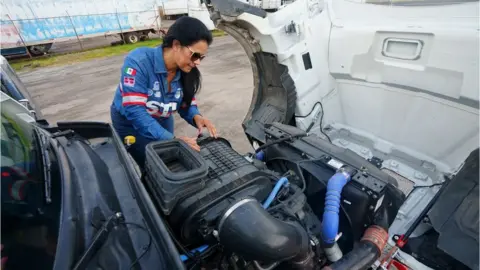 Álvaro Álvarez
Álvaro ÁlvarezLuckily, the young man with the gun didn't completely lack compassion.
Barely out of his teens, he said his own father had beaten his mother, and then abandoned the family. He'd joined a gang to support his mother, he said.
"Somehow we bonded… we spent hours talking, me trying to convince him to abandon crime and sort himself out," Fragoso says.
Eventually, her captor let her go, though the hooded men stole the lorry and its cargo.
"We lorry drivers always say that, among the 'rats' that we encounter, there are good ones and bad ones. I was lucky I've always come across good rats."

In Mexico, women lorry drivers represent just 2% of a workforce of 500,000. It's a similar story in many other countries.
"Less than 3% of truck drivers are women in all regions," says the International Road Transport Organization (IRU), "with notable exceptions in China (5%) and the US (8%)."
Meanwhile, the industry is facing labour shortages.
That's why Fragoso and some of her colleagues believe they can help transform it by making more space for women.
Liszt Hyde González, Liszy to her friends, is one of the most vocal among them.
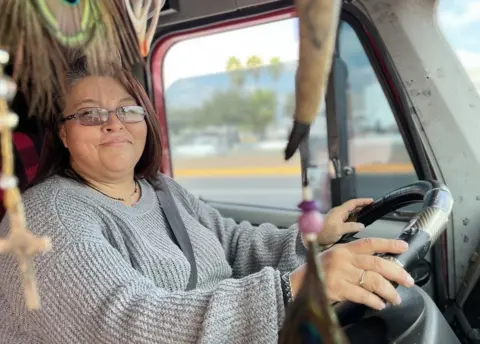 Leire Ventas
Leire VentasLike many in the industry, she is also a survivor of domestic violence and didn't always seek a life behind the wheel.
"Being a lorry driver was not a dream, I saw it as a solution for my financial problems. What I dreamt of was driving a red convertible on the road, with the wind blowing my hair. At least now I drive a red truck!" says the 45-year-old, as she gets her red lorry, Diavolo, ready for the road.
She needs to set off soon from her home city of Querétaro, north-west of Mexico City, if she is to reach the border city of Nuevo Laredo before dark.
This is the main land port for goods leaving Mexico and entering the US - a business worth $800m daily, with products ranging from car parts to clothing and avocados.
To get there she needs to drive more than 1,000km, including three hours on a stretch north of Monterrey unofficially known as "the highway of death" or the "Bermuda triangle". It's one of Mexico's most dangerous roads, controlled by the country's powerful drug cartels.
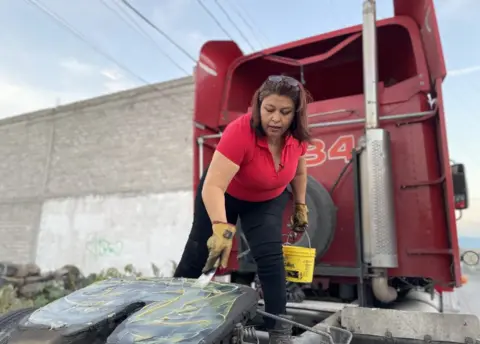 Leire Ventas
Leire Ventas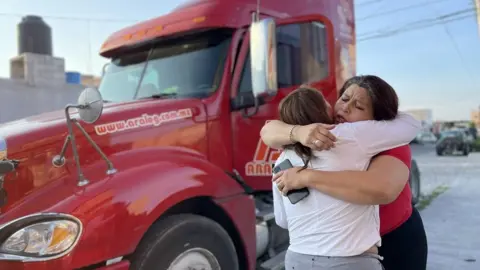
"They know who and where I am, what I'm carrying. They are better equipped than any state," González says.
There are police checkpoints and patrols - but these are no guarantee of safety, drivers and security experts told the BBC.
Just like Fragoso, Liszy González was stopped by hooded armed men, who got her off the road to check her load. Mysteriously, they took nothing.
"I never knew what they were after," she says.
"Before letting me go they yelled at me, 'Drive away, don't turn on the lights until you reach the road, and don't warn the policeman you'll see ahead. He's already been paid.'"

Highway robbery
- Between January and September 2023, Mexico recorded 7,028 thefts from lorries - a 10% increase compared to the same period in 2022
- 6,030 of these incidents involved violence, according to official data from the Executive Secretariat of the National Public Security System
- The five states with the highest rate of cargo robberies are Mexico State, Puebla, Michoacán, San Luis Potosí and Jalisco

Super Transporte Internacional (STI), the company Fragoso works for, says that 12% of its fleet is targeted by robbers every year, while Mexico's National Association of Transporters (Antac) puts the annual cost of cargo theft at $137m.
Sometimes it is their fuel that is stolen, and there are times when they have to pay a fee to cross an area controlled by a gang.
In theory all this should be prevented by the National Guard, created by the Mexican government in 2019. Last year President Andrés Manuel López Obrador said it had more than 100,000 officers.
"The National Guard is on all the roads so that there are no crimes," he announced.
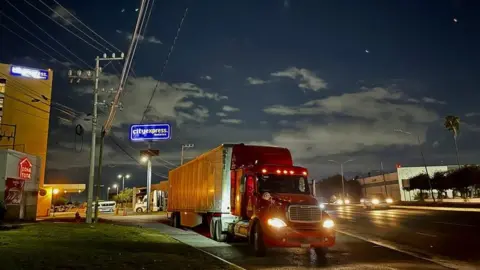
There are also other problems that worry Fragoso and her fellow traileras.
There are, for instance, very few stops with proper showering facilities for women. González is now used to her freshen-up routine in her cabin: starting with the hair and using a bucket and a cup, being very careful not to splatter the small space at the back where she has her folding bed.
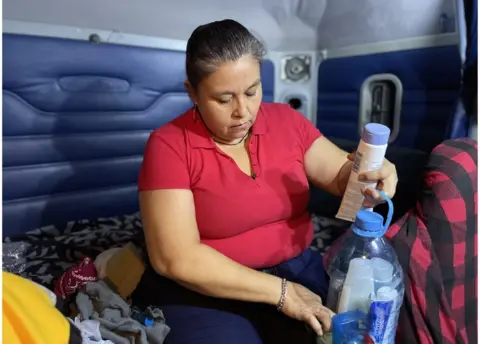 Leire Ventas
Leire VentasAnd then there's the constant threat of harassment.
"In this male-dominated environment you need to learn to swim among sharks," says González.
"Treat them with respect so that they respect you, but also be brave and say: 'This is a red line. Don't you dare cross it.'"
She knows of colleagues who have been raped, and says she was once sacked for refusing to sleep with a union leader - one of many occasions when men have tried to pressurise her into having sex.
Both women are avid social media users, sharing posts about the day-to-day life of women lorry drivers and fighting against stereotypes in the business. González's Truckers Ladies Facebook page has some 65,000 followers, while Fragoso has 162,000 on Facebook, Instagram and TikTok combined.
Fragoso has also made it her mission to mentor and motivate beginners.
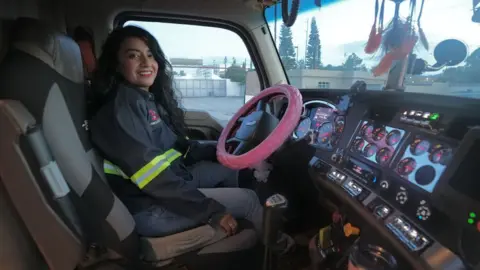 Álvaro Álvarez
Álvaro ÁlvarezRecently she's been helping Martha Patricia Trejo, a 37-year-old mother of two from Guanajuato, who recently joined her company along with nine other new women drivers.
They talk frequently over the phone. Fragoso checks on Trejo's confidence, and worries about how male colleagues may be treating the newcomer.
"Remember, stay focused," she tells Trejo in a WhatsApp call during a road stop. "Plan your meals, check the GPS. Don't waste energy on anything that is not vital - there will be a time and place to have fun with colleagues."
She also gives Trejo advice on how to cope with emotional stress - the anxiety caused by the dangers of the job, but also the guilt and heartache that come from constantly leaving one's children behind.
And she warns her not to imitate the large number of drivers who she says take drugs to help them endure long days.
The transport industry "has many issues that are not talked about", Fragoso says.
"And as long as we don't address the bad habits, it will never change."
She is convinced that welcoming more women into the workforce would not only resolve the current labour shortage but also help transform the sector from within.
González, meanwhile, offers advice to would-be drivers who contact her via social media.
"I've been a wife, I've raised my children, I've done many things. Now I'm creating dreams," she says.
She jumps up into the cabin, ready to steer Diavolo out of a parking lot in Monterrey, on to "the highway of death" and all the way to the US border. Just another day on the road as a trailera.
Production and additional reporting: Montserrat Bustos and Ulises Escamilla


Meet Clara, Liszy and Paty - some of Mexico's traileras, women truck drivers travelling long distances on the country's dangerous routes.

BBC 100 Women names 100 inspiring and influential women around the world every year. Follow BBC 100 Women on Instagram and Facebook. Join the conversation using #BBC100Women.
